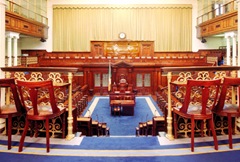A changing political system
 The new Government has started implementing an agenda of political reform, but there is much to be done. Stephen Dineen examines some of the changes.
The new Government has started implementing an agenda of political reform, but there is much to be done. Stephen Dineen examines some of the changes.
The wheels of political reform have been set in motion, but how far will they turn? The coalition has committed itself to significant political reform and has introduced several measures since coming into office.
At its first meeting after taking office the Cabinet agreed to pay cuts of 7 per cent for the Taoiseach, Tánaiste, ministers and ministers of state. This was followed by changes to the system for ministerial cars: with the exception of the Taoiseach, Tánaiste and the Minister for Justice, all ministers must now supply their own cars and civilian drivers.
Severance pay for ministers is to cease and vacancies on state boards are now advertised before appointments are made.
In June the Minister for the Environment, Phil Hogan, published the Electoral (Amendment) Bill 2011, which is currently before the Oireachtas. It will reduce the limit of spending in presidential elections from €1.3 million to €750,000 per candidate. By-elections will have to be called within six months of a vacancy arising, and the terms of reference of the new electoral boundary commission will mean between six and 13 less TDs in the next Dáil.
The committee system was reformed. The number of committees was reduced from 25 to 15 and the power of legislative initiation given to them. Among the new committees is the Committee on Investigations, Oversight and Petitions.
At the end of the Dáil’s (longer than usual) summer session the Government announced Dáil reforms that enjoy cross- party support. The Dáil will start earlier on Tuesdays and finish later on Tuesdays and Thursdays. Leaders’ questions will now happen three days a week instead of two; ministers in the relevant department will have to participate in the re-vamped adjournment debates (to be called topical debates); and members will be able to request and receive further information if he or she believes (and the Ceann Comhairle agrees) a question has not been fully answered.
The promise to introduce Friday sittings and increase Dáil sitting days by 50 per cent has only partially materialised. The Dáil will only sit on the first Fridays of the month, for three hours, and there will be no votes. eolas calculates that even if the Dáil returns on a Tuesday after every bank holiday weekend in 2012, the shortened summer recess, the first Fridays sittings and an end to “mid-term breaks” will only increase sitting by 40 per cent from the 100 days it sat in both 2009 and 2010.
Hogan plans to publish an Electoral (Amendment) (Political Funding) Bill this year. It will contain provision for candidate gender quotas. Parties will lose some state funding unless 30 per cent of candidates in the next general election are female, to be increased to 40 per cent of candidates after seven years. Fifteen per cent of current TDs are female.
The bill will also severely curtail corporate donations. All donations above €200 from sources not registered with the Sipo Commission will be prohibited, as will donations from individuals above €2,500 to a party or €1,000 to an individual politician. The threshold at which donations must be declared will be lowered to €1,500.
In October the Government will hold a referendum on the powers of Oireachtas committees. Because of the Abbeylara judgement in 2001, Oireachtas committees cannot make findings of fact or expressions of opinion that adversely affect the reputation of a citizen (who is not a member of the Oireachtas). They are also unable to compel witnesses. The Taoiseach has said that the proposal will centre on giving powers of investigation and compellability to Oireachtas committees.
Legislation to protect whistleblowers and a referendum to give members of the public the right to communicate in confidence with public representatives are promised, as are a register of lobbyists and an electoral commission. The issue of the Seanad’s future has been deferred to a constitutional convention, and though the Government remains committed to abolishing it, members of both coalition parties have expressed reservations about the proposal.
The Government’s intentions in the area of local government remain vague. Hogan has said he intends publishing a policy statement in the autumn, underpinned by the objectives of devolving more powers to local level and strengthening those of local authorities.





